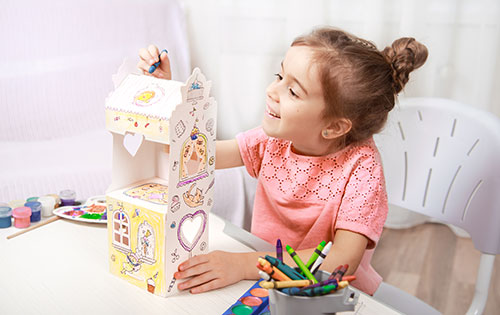“On Track!” – Child Development and Milestones
Childhood is an important phase of growth and development – physical growth, cognitive development and immunity. By the time a child is 5 years, he/she has already achieved 60% of an adult’s height. By 6 years, the brain development is 90% complete. The immune system continues to develop until 5 years of age. During such a dynamic period of growth and change, it is important for us to understand how children learn, behave and live to acquire aspects of their personhood. Infants and children, in a very orderly manner follow neuro-developmental laws or sequences – what we refer to in simple terms as “developmental milestones”. These milestones are typically described in 5 domains.

- Physical (gross motor and fine motor)
- Cognitive or intellectual
- Communicative
- Social and emotional
- Adaptive
At every age and stage, your baby/toddler/pre-schooler/school goer/teenager goes through these 5 areas of development. Certain skills involving these 5 domains have to be acquired by a certain age. These benchmarks, these landmarks are what we refer to as developmental milestones and any delay in attaining these warrants evaluation and intervention. Let us try and understand in simple ways what these domains mean to us.
Physical Development
This domain involves physical growth, development of the senses and motor skills. A few of the gross motor/fine motor milestones and their timelines are presented below.
-
TimelineGross MotorFine Motor
-
Birth to 6 monthsHead control.
Roll over.Reaching out and grasping objects.
Playing with fingers, hands and toes. -
6 to 12 monthsSitting.
Crawling.
Pulling up to stand.
Walking with support.Transfer of objects from one hand to the other.
Mature grasp.
Points with fingers. -
12 to 18 monthsStanding and walking alone.
Running.
Walking backward.
Squatting.
Climbing up stairs.Scribbling.
Turning several pages of a book at once.
Drinking from a cup.
Feeding self with hands. -
Toddler
1-3 yearsRiding small wheeled toys.
Climbing on and jumping off low objects.
Walking down the stairs one step at a time.Turning doorknobs.
Assisting in dressing and undressing.
Turning individual pages of a book.
Scribbling circles and lines. -
Pre-schooler
3-6 yearsHopping.
Skipping.
Jumping.
Playing “catch” with a ball.Building block towers.
Holding pencils and crayons steadily.
Using spoons and forks.
Copying a simple design. -
School goer
6+ yearsRunning, jumping, climbing, sliding and dancing.Writing skills.
Art and craft activities.
Coordination in sports and games.
Communicative Development
Communicative development is quite the dramatic domain of the 5. This aspect of development involves hearing, understanding, speech and language. From a little baby that coos and babbles between 3 to 6 months to a confident child that narrates a poem flawlessly, it is amazing to see how they learn to speak. The red flag signs in this domain are no single word by 16 months, no 2-word sentences by 2 years, difficulty telling stories at 5 years and difficulty with reading, writing or math in school.
Cognitive Development
Children are instinctively curious by nature. Their keenness for exploration is obvious right from their early stages where they burst into a rapture of giggles as you play peek-a-boo with them! They understand the functional utility of things between 12 to 15 months. When you see them feeding their fluffy little teddy with a spoon between 18 to 24 months, you know they have learnt to “pretend play”. You know they are ready for school when they start to identify letters, numbers, colours and shapes between 3 to 5 years. They understand the concepts of problem solving and perspective between 6 to 12 years. Finally, your little scientists will develop abstract thinking after 13 years.
Socio-Emotional Skills
Smiling, sharing, reacting, recognising and expressing feelings are what make us human and our children learn these along their way. They form relationships and develop confidence as they mature. They learn to relate and empathise. As parents, we need to identify any delays in this domain too. Look out for social awkwardness, temper tantrums, outbursts and inability initiating conversations.
Adaptive Development
Progress in this domain is mostly made by 4 to 5 years. Adaptive development is all about self-care and activities of daily living. Adaptive development happens only when the developments in the other domains are age appropriate. This is what makes children move up in their journey to become a “grown-up”!
Our Role as Parents
We parents are our children’s first teachers! It is our duty to engage the child in age-appropriate stimulatory activities and play. Our primary responsibility is to provide an environment which is conducive to acquiring these skills.
As a paediatrician, in my wellness checks/immunization visits, I strongly encourage parents to share “What’s new?” with their little one. These visits provide an opportunity for me to assess the child’s developmental status, provide advice on good home stimulation, pick up early warning signs and advice remedial measures for the same.
We are here for our children and we are in this together!
Happy parenting!

Dr. Lakshmi Prashanth, MD
Consultant Pediatrician
Kauvery Hospital, Chennai

